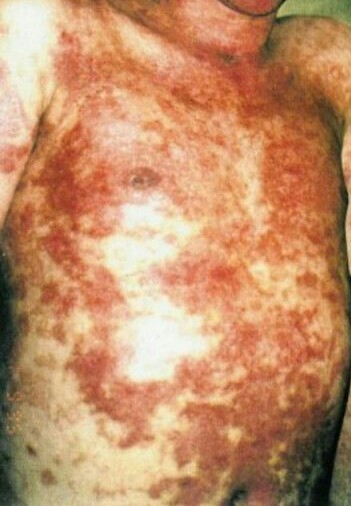
The Minister of Health, Prof. Isaac Adewole, on Friday, announced the outbreak of a killer disease known as Stevens-Johnson Syndrome in the country, at a news conference in Abuja.
Adewole said the disease had already killed one person while another person was responding to treatment at the National Hospital, Abuja. The health condition, according to the Minister, is an unusual allergic reaction to medications found in some parts of Europe and Nigeria.
Urging Nigerians not to panic, Adewole stated that the Federal Government was doing everything possible to ensure the immediate control of the disease and avert an outbreak.
He urged Nigerians to be vigilant and seek urgent medical attention should they notice any sign of a rare disease, and to be more careful while using medications of all kinds.
He called for increased awareness and the need for citizens to read drug leaflets before its use and tasked Nigerians to patronize health practitioners, and also seek immediate medical attention when reaction occur due to drug use or any unexplained reaction. He further warned that the syndrome which is unpredictable and more prevalent in women, had killed a sibling of a marathoner, Fedeshola Adedayo.
At the press conference, a Senior Consultant Physician/Dermatologist at the National Hospital, Abuja, Dr. Olanrewaju Falodun, hinted that the “SJS is an immune complex mediated hypersensitivity reaction that typically involves the skin and mucous membranes and was first described in 1922 by Albert Stevens and Frank Johnson.
“SJS is a rare and unpredictable reaction, and is also a minor form of toxic epidermal necrolysis with less than 10 per cent body surface area involvement.
“SJS is a rare but serious and potentially life-threatening contagious drug reaction. Incidence of SJS is estimated between 1.1 and 7.1 cases per million per year and is more prevalent in women than men. Incidence in Europe is two per million per year.”
He further stated that the incidence of the disease is higher in Africa because of the extensive use of herbal drugs and the prevalence of HIV.
He said the symptoms of the syndrome include fever, runny nose, general aches and pains, sore throat, fatigue, ulcers in mouth, genitals, anal regions as well as conjunctivitis.
With health complications such aa pigmentation problems, ulcer, blindness, skin scarring, scarred genitals, joint pains, lung diseases, obstructive disorders and eye complications and adhesions.
He disclosed that management of the disease include cessation of suspected drugs; hospital admission, preferably in burns unit/intensive care; nutritional and fluid replacement; temperature maintenance; pain relief and mouth care.
Other identified infections that can cause the disease to include: Herpes (herpes simplex or herpes zoster); Pneumonia; HIV and Hepatitis.






